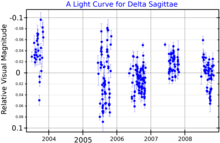
| |
| Observation data Epoch J2000 Equinox J2000 | |
|---|---|
| Constellation | Sagitta |
| Right ascension | 19 47 23.26653 |
| Declination | +18° 32′ 03.5203″ |
| Apparent magnitude (V) | +3.82(3.91/ 6.64) |
| Characteristics | |
| Spectral type | M2II + B9.5V |
| U−B color index | +0.98 |
| B−V color index | +1.40 |
| Variable type | LB? |
| Astrometry | |
| Radial velocity (Rv) | 2.5 ± 0.9 km/s |
| Proper motion (μ) | RA: -6.514 mas/yr Dec.: 0.849 mas/yr |
| Parallax (π) | 5.9674 ± 0.2597 mas |
| Distance | 550 ± 20 ly (168 ± 7 pc) |
| Absolute magnitude (MV) | −2.58 |
| Orbit | |
| Period (P) | 10.15 yr |
| Semi-major axis (a) | 0.051″ |
| Eccentricity (e) | 0.453 |
| Inclination (i) | 140.0° |
| Longitude of the node (Ω) | 170.2° |
| Periastron epoch (T) | 1979.93 |
| Argument of periastron (ω) (secondary) | 257.7° |
| Details | |
| δ Sge A | |
| Mass | 4.073 M☉ |
| Radius | 223 – 267 R☉ |
| Surface gravity (log g) | 0.74 ± 0.10 cgs |
| Temperature | 3,660±170 K |
| δ Sge B | |
| Mass | 3.611 M☉ |
| Radius | 3.3 – 4.7 R☉ |
| Luminosity | 63 L☉ |
| Temperature | 10000 K |
| Other designations | |
| δ Sagittae, 7 Sagittae, BD+18 4240, CCDM J19474+1832AB, FK5 743, GC 27391, HD 187076, HIP 97365, HR 7536, IDS 19429+1817 AB, PPM 136976, SAO 105259, WDS J19474+1832AB | |
| Database references | |
| SIMBAD | data |
Delta Sagittae (Delta Sge, δ Sagittae, δ Sge) is a binary star in the constellation of Sagitta, with an apparent magnitude of +3.68. The primary component is a red M-type bright giant, and the secondary is a B-type main-sequence star. It is approximately 430 light years from Earth, based on its Gaia Data Release 2 parallax.

Delta Sagittae is a spectroscopic binary with a composite spectrum, meaning that light from both stars can be detected. It has an orbital period of about 10 years and an eccentricity of about 0.44. It is also a variable star, with its brightness changing between a maximum of magnitude 3.75 and a minimum of 3.83 in an unpredictable way.
Delta Sagittae is moving through the Galaxy at a speed of 9.8 km/s relative to the Sun. Its projected Galactic orbit carries it between 23,800 and 35,300 light years from the center of the Galaxy.
Naming
In Chinese, 左旗 (Zuǒ Qí), meaning Left Flag, refers to an asterism consisting of δ Sagittae, α Sagittae, β Sagittae, ζ Sagittae, γ Sagittae, 13 Sagittae, 11 Sagittae, 14 Sagittae and ρ Aquilae. Consequently, the Chinese name for δ Sagittae itself is 左旗三 (Zuǒ Qí sān, English: the Third Star of Left Flag.)
References
- ^ Brown, A. G. A.; et al. (Gaia collaboration) (August 2018). "Gaia Data Release 2: Summary of the contents and survey properties". Astronomy & Astrophysics. 616. A1. arXiv:1804.09365. Bibcode:2018A&A...616A...1G. doi:10.1051/0004-6361/201833051. Gaia DR2 record for this source at VizieR.
- ^ "* del Sge". SIMBAD. Centre de données astronomiques de Strasbourg. Retrieved 23 February 2017.
- Calculated from subtracting magnitudes.
- ^ Eaton, Joel A.; Hartkopf, William I.; McAlister, Harold A.; Mason, Brian D. (1995). "Winds and accretion in delta Sagittae". Astronomical Journal. 109 (4): 1856–1866. Bibcode:1995AJ....109.1856E. doi:10.1086/117412.
- ^ Mermilliod, J.-C. (1986). "Compilation of Eggen's UBV data, transformed to UBV (unpublished)". Catalogue of Eggen's UBV Data. Bibcode:1986EgUBV........0M.
- ^ Samus, N. N.; Durlevich, O. V.; et al. (2009). "VizieR Online Data Catalog: General Catalogue of Variable Stars (Samus+ 2007-2013)". VizieR On-line Data Catalog: B/GCVS. Originally Published in: 2009yCat....102025S. 1: B/gcvs. Bibcode:2009yCat....102025S.
- Wilson, Ralph Elmer (1953). "General catalogue of stellar radial velocities". Carnegie Institute Washington D.C. Publication. Bibcode:1953GCRV..C......0W.
- Brown, A. G. A.; et al. (Gaia collaboration) (2021). "Gaia Early Data Release 3: Summary of the contents and survey properties". Astronomy & Astrophysics. 649: A1. arXiv:2012.01533. Bibcode:2021A&A...649A...1G. doi:10.1051/0004-6361/202039657. S2CID 227254300. (Erratum: doi:10.1051/0004-6361/202039657e). Gaia EDR3 record for this source at VizieR.
- Anderson, E.; Francis, Ch. (2012), "XHIP: An extended hipparcos compilation", Astronomy Letters, 38 (5): 331, arXiv:1108.4971, Bibcode:2012AstL...38..331A, doi:10.1134/S1063773712050015, S2CID 119257644.
- ^ Eggleton, Peter P.; Yakut, Kadri (2017). "Models for 60 double-lined binaries containing giants". Monthly Notices of the Royal Astronomical Society. 468 (3): 3533–3556. arXiv:1611.05041. doi:10.1093/mnras/stx598.
- Schröder, K.-P.; Cuntz, M. (2007). "A critical test of empirical mass loss formulas applied to individual giants and supergiants". Astronomy and Astrophysics. 465 (2): 593–601. arXiv:astro-ph/0702172. Bibcode:2007A&A...465..593S. doi:10.1051/0004-6361:20066633. S2CID 55901104.
- Messineo, M.; Brown, A. G. A. (2019). "A Catalog of Known Galactic K-M Stars of Class I Candidate Red Supergiants in Gaia DR2". The Astronomical Journal. 158 (1): 20. arXiv:1905.03744. Bibcode:2019AJ....158...20M. doi:10.3847/1538-3881/ab1cbd. S2CID 148571616.
- Tabur, V.; Bedding, T. R.; Kiss, L. L.; Moon, T. T.; Szeidl, B.; Kjeldsen, H. (December 2009). "Long-term photometry and periods for 261 nearby pulsating M giants". Monthly Notices of the Royal Astronomical Society. 400 (4): 1945–1961. arXiv:0908.3228. Bibcode:2009MNRAS.400.1945T. doi:10.1111/j.1365-2966.2009.15588.x. S2CID 15358380.
- "Delta Sagittae (HIP 97365)". Archived from the original on 2013-01-02. Retrieved 2012-09-17.
- (in Chinese) AEEA (Activities of Exhibition and Education in Astronomy) 天文教育資訊網 2006 年 7 月 3 日 Archived 2011-05-21 at the Wayback Machine
| Constellation of Sagitta | |||||||||||
|---|---|---|---|---|---|---|---|---|---|---|---|
| Stars |
| ||||||||||
| |||||||||||
| |||||||||||
| Nebulae |
| ||||||||||